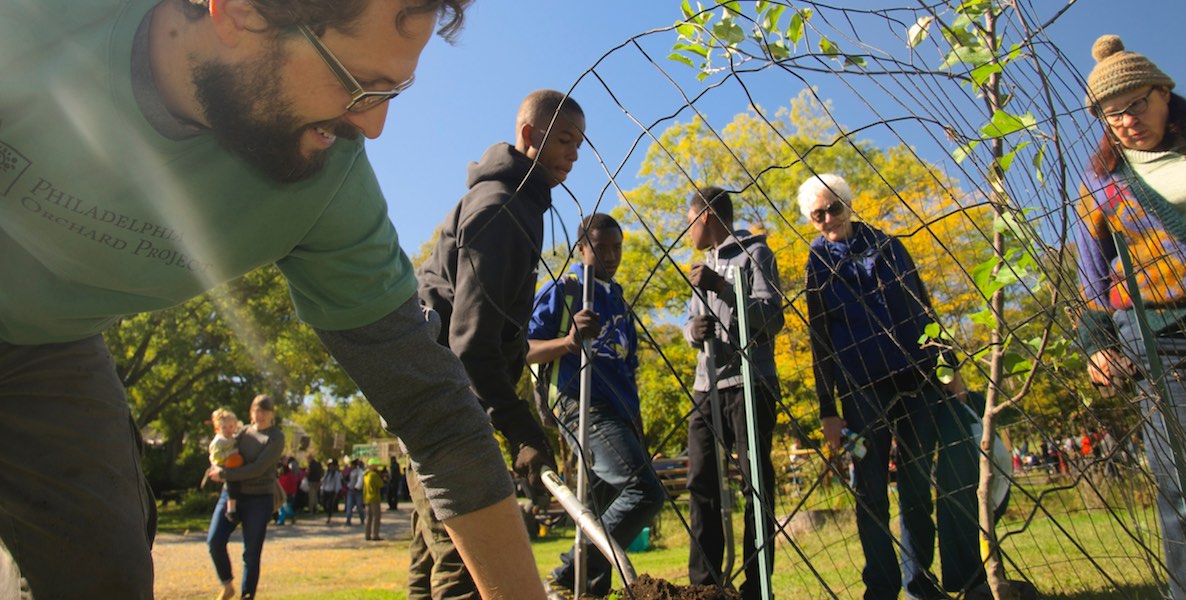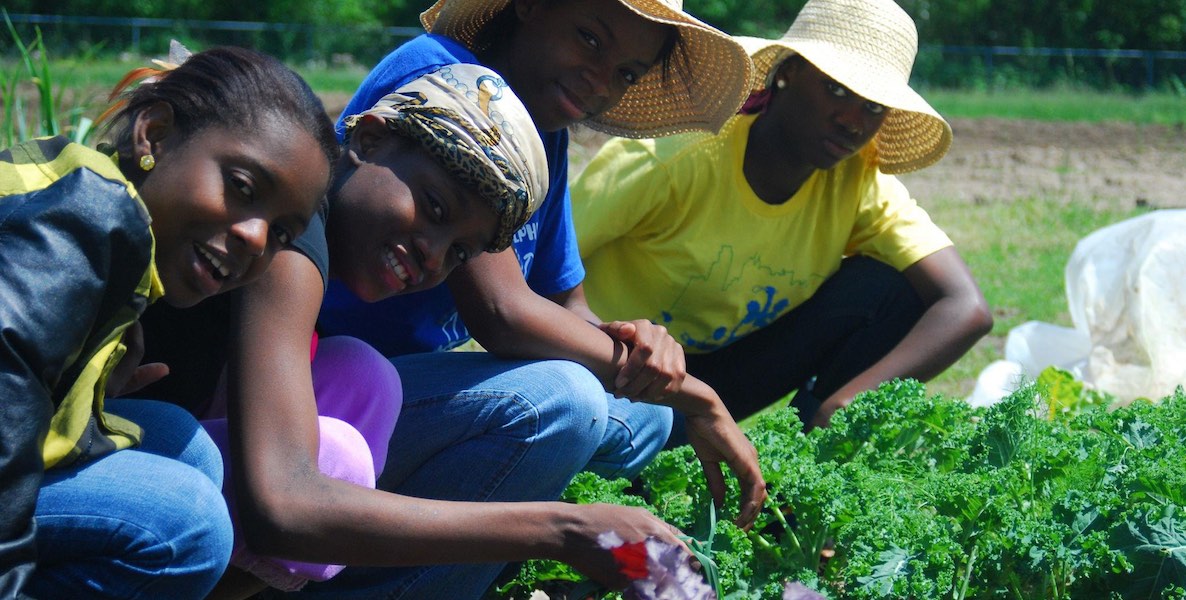At first, the children—from Strawberry Mansion, a corner of the city not known for its lush greenery—are shy around the plants. Many of them, understandably, have never seen such urban strangers as these, growing outside historic Strawberry Mansion in East Fairmount Park: Rows and rows of strawberry plants, their leaves hiding bushels of tiny, juicy fruit.
But then, a volunteer with Philadelphia Orchard Project gets down on his knees, and demonstrates the proper way to gently pluck a strawberry, fresh off its stem. He pops it in his mouth. And the children, delighted, join in. “Once they have a little guidance,” notes POP executive director Phil Forysth, ”the children gorge on the strawberries. It’s really fun to see.”
The orchard at Strawberry Mansion (which held its annual Strawberry Festival last weekend) is just a few blocks from Strawberry Mansion High School. But it may as well be deep in farm country. It’s quiet, and green, and full of promise: Fruit buds are popping up on the peach and pear trees, still small enough at just three years old that Forsyth can almost reach the top branches. From here, you can’t see the bedraggled neighborhood that abuts this part of the park; you can’t tell it’s in the middle of an urban desert, where most of the “greenery” is a weed-strewn lot here or there.
To date, POP has planted 54 orchards around the city. Last year, POP volunteers harvested 3,000 pounds of fruit. Most of it went back into the community, either taken home by the harvesters or sold at farmer’s markets, which accept SNAP benefits.
This is precisely the point of POP, founded in 2007 by longtime social entrepreneur Paul Glover, who had a simple but powerful idea: Turn the city’s 40,000 vacant lots into urban orchards that can provide food to area residents. “I’d be riding high and low on my bike throughout the city, and I saw vacant lots amidst all this hunger,” says Glover, who moved here 11 years ago from Ithaca and was Pennsylvania’s Green Party candidate for Governor in 2014. “I knew there was a way to bring those together.”
POP’s first orchard, in a vacant lot at 7th and Snyder, was followed quickly by plantings in every part of the city, in neighborhoods, churches, schools and park land. To date, POP has planted 54 orchards around the city, some with just a few trees and plants, some with a full-scale operation of fruit trees, berry bushes and community gardens. Last year, POP volunteers harvested 3,000 pounds of fruit, from its orchards and some others around the city and suburbs (like trees on Penn’s campus). Most of it went back into the community, either taken home by the harvesters or sold at farmer’s markets, which accept SNAP benefits. Forsyth says POP plants two to three new orchards every fall and spring, with the hope of filling every available space with gardens.
“This is making good use of Philadelphia’s many open spaces,” says Forsyth. “It’s an orchard; it’s educational; it creates spaces where people can gather to learn about our food systems and reconnect to nature and to other people—everyone relates to food.”

For Glover, who grew up in the Finger Lakes region of upstate New York, the lessons of POP are essential. “I came from a beautiful city in a beautiful region, amid nature,” he says. “To discover here, thousands of children have no familiarity and access to nature is intolerable to me.” In Ithaca in the 90s, Glover created the country’s first regional currency, Ithaca Hours, accepted by 500 local businesses, and founded the nonprofit Ithaca Health Alliance, for uninsured residents. In Philly, he has founded Green Jobs Philly, a network for finding eco-friendly jobs and grants, and worked on a plan to build a health clinic, recreation area and community garden on the Logan Triangle. (The land was sold instead to a developer, to build a shopping mall and the Philadelphia Youth Basketball arena.)
The idea for POP dates back to the early 80s, when Glover lived in Los Angeles, and wrote a book advocating a more ecologically-friendly L.A.—including a scenario in which the city could produce a significant amount of its own food. “I have long believed that food production should be a permanent part of the structure, economy and culture of every city,” says Glover. “That’s what POP is working towards.”
POP orchards, big or small, contain the same elements: Berries; pollinating bushes; and fruit trees, like figs. (“We’ve created fig farms all over the city,” says Forsyth. “For most kids, the closest they’ve ever come to a fig is a fig newton.”) It’s a combination that allows for fruit throughout the early summer and fall. The park around Woodford Mansion, across from Strawberry Mansion, is POP’s flagship orchard; Bartram’s Garden houses its largest. About a third are on previously abandoned lots in neighborhoods with residents who are willing and able to take care of them. All are planted, maintained and harvested by volunteers from the community, usually neighborhood associations that use the gardens to educate residents about growing food, and to provide fresh produce directly to their neighbors.
In Strawberry Mansion, the East Park Revitalization Alliance (EPRA) manages the orchards at both Woodford and Strawberry mansions, using them to teach the children in its after school and summer camp programs how to grow food, and how to eat healthy. EPRA Executive Director Suku John says they take the students to the “outdoor learning centers” at least once a week during the season, hoping to impress on the young residents lessons they’ll take home to their families, and into adulthood. “We’re trying to change the whole food culture in the neighborhood,” John says. “You have to build that from the ground up. These children, having these experiences, they’ll never forget them. It’s our hope that when these children become adults, and are the ones buying food and making decisions, there will be more options for them.”
POP’s 2.5 staff members screen applicants to make sure there is a stable and active group of neighbors, with legal and long-term access to the site; help them design the orchard and make a plan for the harvest; purchase the plants and organize POP’s 1,100 active volunteers to help throughout the year as needed. Each orchard also has a volunteer manager trained by POP, who visits several times a season, helps manage the site and answers basic questions. (Like: What is this plant disease and how do we get rid of it?) It’s not just gardens that POP grows; it’s a community of gardeners.
“I’d be riding high and low on my bike throughout the city, and I saw vacant lots amidst all this hunger,” says POP founder Paul Glover, who was Pennsylvania’s Green Party candidate for Governor in 2014. “I knew there was a way to bring those together.”
“POP’s success depends on the success of our partners,” says Forsyth, a Providence native who gave up landscaping because it was too much about luxury clients and not enough about food production. “Ones that fulfill the vision of what we want the outcome to be—good production of fruit and use as educational spaces—are the ones we think of as successful.”

The beauty of POP—besides the literal beauty—is the way it touches and resolves so many issues facing Philadelphia. It helps the city’s ongoing effort to plant more trees; introduces fresh produce into food deserts; brings the thrill of nature and growing to generations of people who have never picked a berry off a plant or a pear off a tree before. It also brings communities together in a safe green space, turning sometimes overlooked or neglected corners into havens for a neighborhood. Glover notes that Woodford Mansion used to struggle with frequent graffiti and vandalism on its historic grounds. That stopped after POP planted its orchard.
“The thing that gets me up in the morning, is that the city is full of beautiful children and they deserve a city as beautiful as they are,” says Glover. “That’s my idea of progress.”
Glover says he’s always awed by the way children react to what they see in the orchards. In particular, he says, it’s the worms that get them every time. And no wonder. These are city kids; the notion of planting a garden is surprising, and enlightening. “Every time, we encounter kids who have never seen a worm before,” says Paul Glover, POP founder. “They carry it around, show it to each other—sometimes, they even name it. It’s incredible.”
Photo courtesy Philadelphia Orchard Project




